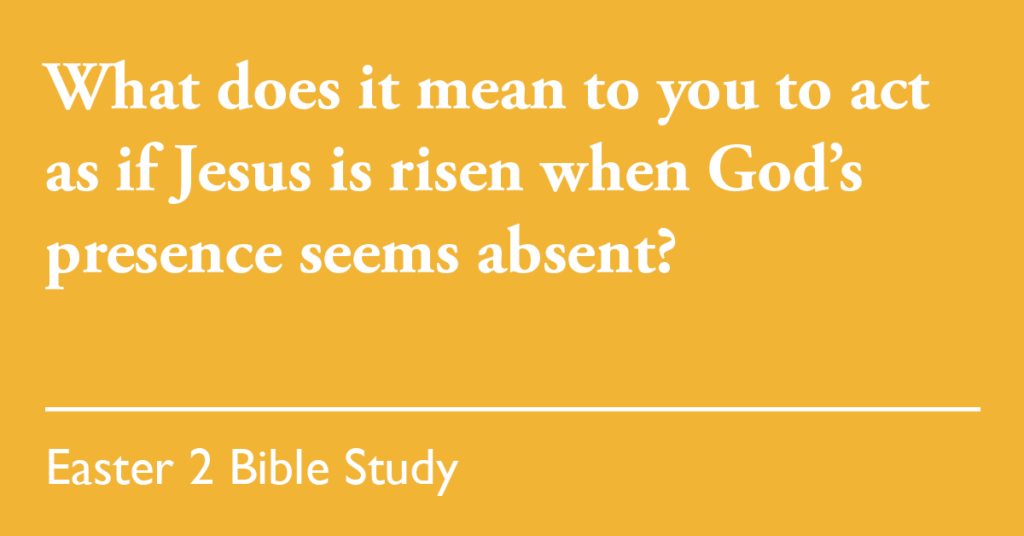This page is available in: Español
Bible Study: Easter 2 (A) – 2023
April 16, 2023
[RCL] Acts 2:14a, 22-32; Psalm 16; 1 Peter 1:3-9; John 20:19-31

Acts 2:14a, 22-32
This is part of Peter’s first sermon, given at Pentecost. The Holy Spirit had just come down from heaven and the crowd was in an uproar, yelling that those who had been overcome by the Holy Spirit were actually overcome by drunkenness! In the first part of the sermon, he quotes extensively from Joel, and in this part, he quotes from today’s psalm. Peter knows the word of God well, and he is able to reach for Scripture to preach his first sermon under conditions he never could have imagined.
- What words of wisdom, from Scripture or otherwise, come to you in overwhelming situations?
- What passages of Scripture would you like to know better, so that you can lean on them in these situations?
Psalm 16
The Psalmist writes of their trust in God. They name the best things already in their life, the things that bring them delight, and state their belief that, not only do all good things come from God but that the protection and joy they hope for in the future will also come from God. And, wait – this passage looks so familiar! Didn’t we just read this? Yes, this is the psalm that is quoted in the earlier reading from Acts. Paul interprets this psalm as referring to Christ: God ensures that the Psalmist will not be abandoned, and neither will Christ be abandoned to the grave forever, but resurrected.
- What good things in your life are you thankful for?
- What does it mean when the Psalmist says, “I will bless the Lord who gives me counsel; my heart teaches me, night after night”?
1 Peter 1:3-9
Today’s Gospel talks about Thomas, the disciple who doubted whether Jesus was really risen. This reading, however, is from a letter to the faithful who have not seen their savior or their salvation. “Although you have not seen [Jesus], you love him,” the author writes, also saying that salvation is “ready to be revealed” – as in, not yet revealed. Often, we do not see or feel God’s presence in our lives.
- What does it mean to you to act as if Jesus is risen when God’s presence seems absent?
- What does joy mean to you, and how is it different from happiness or toxic positivity?
John 20:19-31
The first part of this story connects to the Pentecost story in today’s first lesson – the disciples experience the Holy Spirit. One commentary on this passage says, “Just as God once breathed his spirit into man in the creation story (Gen 2:7), so Jesus now does so with the words: ‘Receive the Holy Spirit.’ At this point Easter and Pentecost fall together” (Hermeneia, p. 211). This chapter is full of the disciples’ desire to see evidence in order to believe the Resurrection. It’s also a chapter full of disbelief and mistrust. Thomas doesn’t believe his friends for a whole week that Jesus is alive! But Jesus is able to enter through any closed doors – the literal closed doors of the house, and the figurative closed doors of Thomas’ disbelief. Thomas doesn’t believe because of Jesus’ personality or face or presence, but because of Jesus’ scars. Thomas doesn’t just need to know that the joy of Jesus’ return is real, but that his grief over Jesus’ death was real, too.
- How does this picture of Jesus coming through closed doors compare or contrast with popular images of Christ knocking on a door, waiting to be let in? Which image makes more sense to you, and why?
- What do you wish you could ask Jesus if he came through the door of your house?
This page is available in: Español
Don’t forget to subscribe to the Sermons That Work podcast to hear this sermon and more on your favorite podcasting app! Recordings are released the Thursday before each liturgical date.
Receive Free Weekly Sermons That Work Resources!
This page is available in: Español


